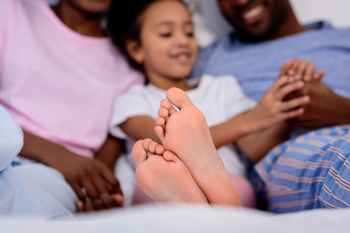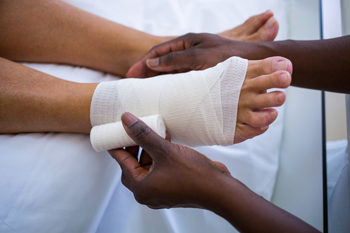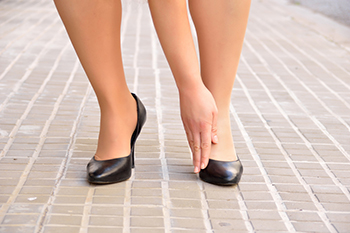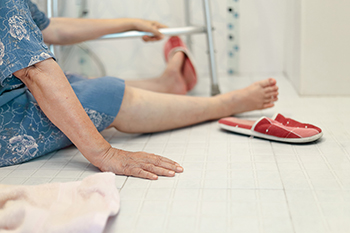March 2023
Flat Feet in Children

Babies are born with flat feet because their bones and joints are flexible until their teenage years. Babies also have a fat pad on the inner border of their feet that hides the arch when standing. Flat feet in kids typically does not require medical treatment because arches will usually develop normally before adulthood. Even if arches do not develop, treatment is not recommended unless the foot feels stiff or causes pain. If such symptoms do occur, it is suggested that a podiatrist be seen for an evaluation and any recommended management for the problem.
Making sure that your children maintain good foot health is very important as they grow. If you have any questions, contact Dr. Robert Marcus of Foot & Ankle Center of Teaneck. Our doctor can provide the care you need to keep you pain-free and on your feet.
Keeping Children's Feet Healthy
Having healthy feet during childhood can help prevent medical problems later in life, namely in the back and legs. As children grow, their feet require different types of care. Here are some things to consider...
Although babies do not walk yet, it is still very important to take care of their feet.
Avoid putting tight shoes or socks on his or her feet.
Allow the baby to stretch and kick his or her feet to feel comfortable.
As a toddler, kids are now on the move and begin to develop differently. At this age, toddlers are getting a feel for walking, so don’t be alarmed if your toddler is unsteady or ‘walks funny’.
As your child gets older, it is important to teach them how to take care of their feet.
Show them proper hygiene to prevent infections such as fungus.
Be watchful for any pain or injury.
Have all injuries checked by a doctor as soon as possible.
Comfortable, protective shoes should always be worn, especially at play.
If you have any questions please feel free to contact our office located in Teaneck, NJ . We offer the newest diagnostic and treatment technologies for all your foot and ankle needs.
Prompt Care Needed for Foot Wounds

Foot wounds can be a serious health issue. A small cut on the skin for many people can be overlooked, but patients who are diabetic understand the need to check their feet daily for existing wounds. Diabetes is a condition that is caused by elevated blood sugar levels in the blood which may lead to neuropathy. This is defined as the inability to feel sensation in parts of the body, particularly the feet. Many diabetic patients find it helpful to check their feet by using a mirror, or possibly a family member or caregiver may be able to help. Foot wounds require immediate care, and this begins with cleaning the wound, followed by applying an appropriate dressing. It is beneficial to refrain from walking barefoot or to avoid it entirely until the healing process is completed. If you would like additional information about how to care for foot wounds, it is suggested that you consult with a podiatrist who is an expert in foot care.
Wound care is an important part in dealing with diabetes. If you have diabetes and a foot wound or would like more information about wound care for diabetics, consult with Dr. Robert Marcus from Foot & Ankle Center of Teaneck. Our doctor will assess your condition and provide you with quality foot and ankle treatment.
What Is Wound Care?
Wound care is the practice of taking proper care of a wound. This can range from the smallest to the largest of wounds. While everyone can benefit from proper wound care, it is much more important for diabetics. Diabetics often suffer from poor blood circulation which causes wounds to heal much slower than they would in a non-diabetic.
What Is the Importance of Wound Care?
While it may not seem apparent with small ulcers on the foot, for diabetics, any size ulcer can become infected. Diabetics often also suffer from neuropathy, or nerve loss. This means they might not even feel when they have an ulcer on their foot. If the wound becomes severely infected, amputation may be necessary. Therefore, it is of the upmost importance to properly care for any and all foot wounds.
How to Care for Wounds
The best way to care for foot wounds is to prevent them. For diabetics, this means daily inspections of the feet for any signs of abnormalities or ulcers. It is also recommended to see a podiatrist several times a year for a foot inspection. If you do have an ulcer, run the wound under water to clear dirt from the wound; then apply antibiotic ointment to the wound and cover with a bandage. Bandages should be changed daily and keeping pressure off the wound is smart. It is advised to see a podiatrist, who can keep an eye on it.
If you have any questions, please feel free to contact our office located in Teaneck, NJ . We offer the newest diagnostic and treatment technologies for all your foot care needs.
Foot Problems From Wearing High Heels

Wearing high heels can impact your feet negatively. While sometimes, no other style will fit with an outfit, the risks of wearing such shoes should be known and their use should be limited. High heels can cause pain and blisters, but they can also injure the ankles or cause stress fractures, as well as make existing foot problems worse. Wearing high heels can also cause pain in the body beyond the feet. One might practice walking in high heels before they are worn, perform stretching and strengthening foot exercises, and soak the feet to try and ward off foot problems. If you have additional questions or concerns about wearing high heels, or if you have foot pain from wearing them, it is suggested that you talk to a podiatrist and obtain an examination of your feet.
High heels have a history of causing foot and ankle problems. If you have any concerns about your feet or ankles, contact Dr. Robert Marcus from Foot & Ankle Center of Teaneck. Our doctor can provide the care you need to keep you pain-free and on your feet.
Effects of High Heels on the Feet
High heels are popular shoes among women because of their many styles and societal appeal. Despite this, high heels can still cause many health problems if worn too frequently.
Which Parts of My Body Will Be Affected by High Heels?
- Ankle Joints
- Achilles Tendon – May shorten and stiffen with prolonged wear
- Balls of the Feet
- Knees – Heels cause the knees to bend constantly, creating stress on them
- Back – They decrease the spine’s ability to absorb shock, which may lead to back pain. The vertebrae of the lower back may compress.
What Kinds of Foot Problems Can Develop from Wearing High Heels?
- Corns
- Calluses
- Hammertoe
- Bunions
- Morton’s Neuroma
- Plantar Fasciitis
How Can I Still Wear High Heels and Maintain Foot Health?
If you want to wear high heeled shoes, make sure that you are not wearing them every day, as this will help prevent long term physical problems. Try wearing thicker heels as opposed to stilettos to distribute weight more evenly across the feet. Always make sure you are wearing the proper shoes for the right occasion, such as sneakers for exercising. If you walk to work, try carrying your heels with you and changing into them once you arrive at work. Adding inserts to your heels can help cushion your feet and absorb shock. Full foot inserts or metatarsal pads are available.
If you have any questions please feel free to contact our office located in Teaneck, NJ . We offer the newest diagnostic and treatment technologies for all your foot and ankle needs.
Preventing Falls in the Grocery Store

When a senior grows older, it is common for the strength in their feet to be diminished. As a result, they might be likely to fall due to this diminished strength, which might, in turn, further injure the feet. The grocery store is one such place in which a senior might be particularly susceptible to suffering a fall. For example, there might be fluids on the floor that could prove to be especially slippery. Also, it is possible that items and products might have fallen from the shelves, creating tripping hazards for seniors. It can be important to do all you can to prevent falling in the grocery store to protect your feet from injury. One important way to do this is to improve mobility and strength in the feet. If you are a senior, you might contact a podiatrist today for more information on how you can prevent falls and to receive treatment for any foot condition you might have.
Preventing falls among the elderly is very important. If you are older and have fallen or fear that you are prone to falling, consult with Dr. Robert Marcus from Foot & Ankle Center of Teaneck. Our doctor will assess your condition and provide you with quality advice and care.
Every 11 seconds, an elderly American is being treated in an emergency room for a fall related injury. Falls are the leading cause of head and hip injuries for those 65 and older. Due to decreases in strength, balance, senses, and lack of awareness, elderly persons are very susceptible to falling. Thankfully, there are a number of things older persons can do to prevent falls.
How to Prevent Falls
Some effective methods that older persons can do to prevent falls include:
- Enrolling in strength and balance exercise program to increase balance and strength
- Periodically having your sight and hearing checked
- Discuss any medications you have with a doctor to see if it increases the risk of falling
- Clearing the house of falling hazards and installing devices like grab bars and railings
- Utilizing a walker or cane
- Wearing shoes that provide good support and cushioning
- Talking to family members about falling and increasing awareness
Falling can be a traumatic and embarrassing experience for elderly persons; this can make them less willing to leave the house, and less willing to talk to someone about their fears of falling. Doing such things, however, will increase the likelihood of tripping or losing one’s balance. Knowing the causes of falling and how to prevent them is the best way to mitigate the risk of serious injury.
If you have any questions, please feel free to contact our office located in Teaneck, NJ . We offer the newest diagnostic and treatment technologies for all your foot care needs.






